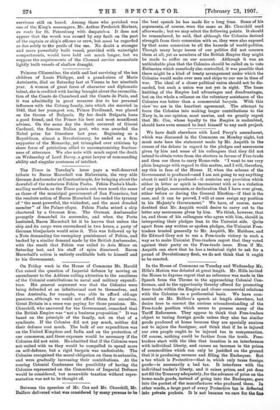We have dealt elsewhere with Lord Percy's amendment, which was
discussed in the Commons on Monday night, but must note here the statement made by Mr. Asquith in the course of the debate in regard to the pledges and assurances given by him and coins of his colleagues that they did not intend to obtain votes from the electors in favour of Free-trade and then use them to carry Home-rule. "I want to use very plain language with regard to this matter, and I will, therefore, say this in face of the House. If, when the scheme of the Government is produced—and I am not going to say anything about it until it is produced—it contains any provision which either in letter or spirit is inconsistent with or is a violation of any pledge, assurance, or declaration that I have ever given, either before or during the General Election—if that is the case, and it can be proved, I will at once resign my position in his Majesty's Government." We have, of course, never doubted that Mr. Asquith would desire to carry out to the letter any assurances given by him. We think, however, that he, and those of his colleagues who agree with him, should in interpreting their pledges lean to the Unionist side. Quite apart from any written or spoken pledges, the Unionist Free- traders trusted generally to Mr. Asquith, Mr. Haldane, and Sir Edward Grey not to use a Free-trade victory in such a way as to make Unionist Free-traders regret that they voted against their party on the Free-trade issue. Even if Mr. Asquith can show that he has a technical right to ask for a pound of Devolutionary flesh, we do not think that it ought to be exacted.










































 Previous page
Previous page